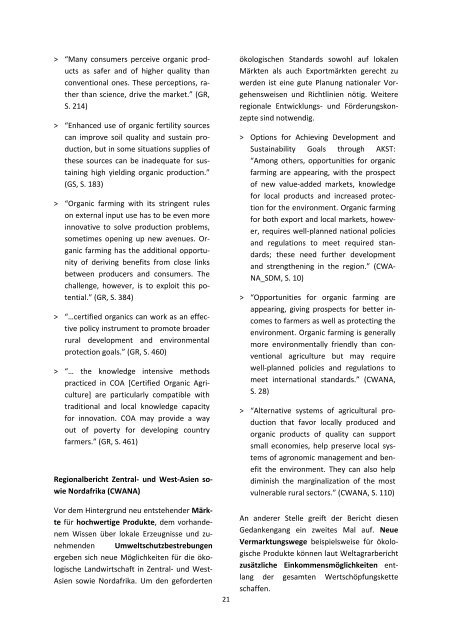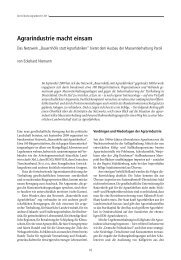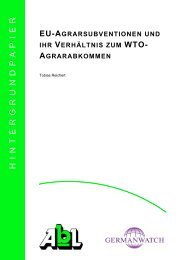Nachhaltige Landwirtschaft und Ökologischer ... - Organic Eprints
Nachhaltige Landwirtschaft und Ökologischer ... - Organic Eprints
Nachhaltige Landwirtschaft und Ökologischer ... - Organic Eprints
Erfolgreiche ePaper selbst erstellen
Machen Sie aus Ihren PDF Publikationen ein blätterbares Flipbook mit unserer einzigartigen Google optimierten e-Paper Software.
“Many consumers perceive organic prod‐<br />
ucts as safer and of higher quality than<br />
conventional ones. These perceptions, ra‐<br />
ther than science, drive the market.” (GR,<br />
S. 214)<br />
> “Enhanced use of organic fertility sources<br />
can improve soil quality and sustain pro‐<br />
duction, but in some situations supplies of<br />
these sources can be inadequate for sus‐<br />
taining high yielding organic production.”<br />
(GS, S. 183)<br />
> “<strong>Organic</strong> farming with its stringent rules<br />
on external input use has to be even more<br />
innovative to solve production problems,<br />
sometimes opening up new avenues. Or‐<br />
ganic farming has the additional opportu‐<br />
nity of deriving benefits from close links<br />
between producers and consumers. The<br />
challenge, however, is to exploit this po‐<br />
tential.” (GR, S. 384)<br />
> “…certified organics can work as an effec‐<br />
tive policy instrument to promote broader<br />
rural development and environmental<br />
protection goals.” (GR, S. 460)<br />
> “… the knowledge intensive methods<br />
practiced in COA [Certified <strong>Organic</strong> Agri‐<br />
culture] are particularly compatible with<br />
traditional and local knowledge capacity<br />
for innovation. COA may provide a way<br />
out of poverty for developing country<br />
farmers.” (GR, S. 461)<br />
Regionalbericht Zentral‐ <strong>und</strong> West‐Asien so‐<br />
wie Nordafrika (CWANA)<br />
Vor dem Hintergr<strong>und</strong> neu entstehender Märk‐<br />
te für hochwertige Produkte, dem vorhande‐<br />
nem Wissen über lokale Erzeugnisse <strong>und</strong> zu‐<br />
nehmenden Umweltschutzbestrebungen<br />
ergeben sich neue Möglichkeiten für die öko‐<br />
logische <strong>Landwirtschaft</strong> in Zentral‐ <strong>und</strong> West‐<br />
Asien sowie Nordafrika. Um den geforderten<br />
21<br />
ökologischen Standards sowohl auf lokalen<br />
Märkten als auch Exportmärkten gerecht zu<br />
werden ist eine gute Planung nationaler Vor‐<br />
gehensweisen <strong>und</strong> Richtlinien nötig. Weitere<br />
regionale Entwicklungs‐ <strong>und</strong> Förderungskon‐<br />
zepte sind notwendig.<br />
> Options for Achieving Development and<br />
Sustainability Goals through AKST:<br />
“Among others, opportunities for organic<br />
farming are appearing, with the prospect<br />
of new value‐added markets, knowledge<br />
for local products and increased protec‐<br />
tion for the environment. <strong>Organic</strong> farming<br />
for both export and local markets, howev‐<br />
er, requires well‐planned national policies<br />
and regulations to meet required stan‐<br />
dards; these need further development<br />
and strengthening in the region.” (CWA‐<br />
NA_SDM, S. 10)<br />
> “Opportunities for organic farming are<br />
appearing, giving prospects for better in‐<br />
comes to farmers as well as protecting the<br />
environment. <strong>Organic</strong> farming is generally<br />
more environmentally friendly than con‐<br />
ventional agriculture but may require<br />
well‐planned policies and regulations to<br />
meet international standards.” (CWANA,<br />
S. 28)<br />
> “Alternative systems of agricultural pro‐<br />
duction that favor locally produced and<br />
organic products of quality can support<br />
small economies, help preserve local sys‐<br />
tems of agronomic management and ben‐<br />
efit the environment. They can also help<br />
diminish the marginalization of the most<br />
vulnerable rural sectors.” (CWANA, S. 110)<br />
An anderer Stelle greift der Bericht diesen<br />
Gedankengang ein zweites Mal auf. Neue<br />
Vermarktungswege beispielsweise für ökolo‐<br />
gische Produkte können laut Weltagrarbericht<br />
zusätzliche Einkommensmöglichkeiten ent‐<br />
lang der gesamten Wertschöpfungskette<br />
schaffen.




